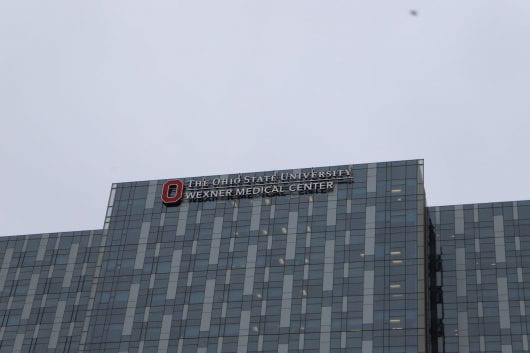
Ohio State medical students are babysitting and getting groceries for medical professionals at several Columbus, Ohio, hospitals. Credit: Amal Saeed | Photo Editor
When trouble comes around, Ohio State’s medical students are ready to help.
Amid the COVID-19 outbreak, the university’s medical students are volunteering to babysit, pet-sit and grocery shop for health care providers at the Wexner Medical Center at Ohio State, Nationwide Children’s Hospital and other Central Ohio hospitals.
Students initially expected to be in the hospitals throughout the entire pandemic with the doctors and nurses, but the university announced the suspension of clinical rotations March 14. That same day, Morgan Amigo, a third-year medical student, tweeted that she would provide babysitting services to doctors and nurses on the front lines.
Amigo said her tweet immediately got responses from students looking to volunteer, health care providers requesting help and others praising her initiative.
“At first it was classmates and local physicians, and then retweet after retweet, it kind of spread, so there were people from all over the country responding to me, asking about their friends, and we even had some international interest as well, asking about how we set up this initiative,” Amigo said.
After Amigo sent information about her babysitting plan to her medical class’ group chat, Renata Reuenthal and Ellen Lubbers, both third-year medical students, decided to join the initiative, Reuenthal said.
“We suddenly have all this time, so why don’t we? We understand the unique burdens that are put on this population. We’re familiar with the kind of work hours involved and the schedule uncertainty. It just seemed like a good fit,” Reuenthal said.
Reuenthal said she and Lubbers created intake forms for volunteers and health care workers to fill out. The intake form included columns that asked students for their address, availability and contact information. The health care workers filled out a form that asked for the dates and times they needed care, their addresses and what services they needed.
The vast majority of the volunteers consisted of nursing and medical students, Reuenthal said.
Benjamin Dralle, a first-year medical student, said he found Amigo’s tweet and notified his medical class. He later tweeted the intake form, and as of Wednesday, Dralle said his tweet has received more than 65,600 views.
In the following 72 hours, there were 91 requests from health care workers, 100 student volunteers and 60 pairs matched, Dralle said. The student volunteers were told by epidemiologists that they were only allowed to babysit for one family in order to ensure everyone’s safety and minimize the spread of the virus, Amigo said.
Amigo said the feedback from this initiative has only been positive. Dralle said nurses and doctors have messaged the students thanking them for volunteering.
“I feel honored that, you know, something that is really simple as a tweet has gone this far, this so far-reaching into a community and beyond,” Amigo said.
Reuenthal said she believes the need for volunteers is increasing along with the number of COVID-19 cases, and doctors are working more hours.
The three medical students said that after the first 72 hours, the medical center reached out and told the students to sign up on child care app Juggle instead of creating matches on the intake form. However, the matches made prior to the switch to Juggle were still able to continue their arrangements, Reuenthal said.
Volunteers are not able to babysit right away once the pairs are made on Juggle, Reuenthal said. On the sign-up form, student volunteers are required to undergo a background check even though medical students had to complete that requirement before doing clinical rotations in the medical center. She said the process might need to be streamlined.
Reuenthal said the medical students’ initiative and action embody what the Ohio State community is, which is why she chose to come to Ohio State.
“As cheesy as it may sometimes sound, the ‘how firm thy friendship’ phrase and motto really rings true in the face of this crisis. And I think that the OSU community has long been defined by a spirit of compassion and community support,” she said.
Medical students have also been given other volunteer opportunities to screen medical center visitors at the entrance and work in the COVID-19 testing lab instituted by the university, Amigo said. As a precaution, students who work in the medical center are not allowed to volunteer to babysit for a family.
Dralle said hospitals and medical students are looking for individuals to donate food items, protective equipment — such as N95 masks and nitrile disposable gloves — and blood in a donation center that is taking extra precautions and practicing social distancing.


